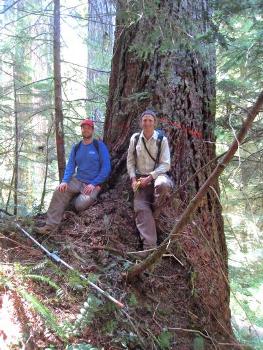Jul 21 2014
The size and age of plants has more of an impact on their productivity than temperature and precipitation, according to a landmark study by University of Arizona researchers.
 Sean Michaletz (left) and Brian Enquist take a break from measuring trees in an old-growth forest in Oregon. The large tree behind them is an example of an old, large tree with a low growth rate, absorbing carbon from the atmosphere and making food for animals like squirrels and birds. Credit: Irena Simova
Sean Michaletz (left) and Brian Enquist take a break from measuring trees in an old-growth forest in Oregon. The large tree behind them is an example of an old, large tree with a low growth rate, absorbing carbon from the atmosphere and making food for animals like squirrels and birds. Credit: Irena Simova
UA professor Brian Enquist and postdoctoral researcher Sean Michaletz, along with collaborators Dongliang Cheng from Fujian Normal University in China and Drew Kerkhoff from Kenyon College in Gambier, Ohio, have combined a new mathematical theory with data from more than 1,000 forests across the world to show that climate has a relatively minor direct effect on net primary productivity, or the amount of biomass that plants produce by harvesting sunlight, water and carbon dioxide.
The findings will be available as an advance online publication by the journal Nature on July 20.
"A fundamental assumption of our models for understanding how climate influences the functioning of ecosystems is that temperature and precipitation directly influence how fast plants can take up and use carbon dioxide," said Enquist, a professor in the UA's Department of Ecology and Evolutionary Biology whose research lab led the study.
"Essentially, warm and wet environments are thought to allow plant metabolism to run fast, while cold and drier environments slow down metabolism and hence lower biomass production in ecosystems," he said. "This assumption makes sense, as we know from countless experiments that temperature and water control how fast plants can grow. However, when applied to a the scale of entire ecosystems, this assumption appears to not be correct."
To test the assumption on the scale of ecosystems, the team developed a new mathematical theory that assesses the relative importance of several hypothesized drivers of net primary productivity. That theory was then evaluated using a massive new dataset assembled from more than 1,000 different forest locations across the world.
The analysis revealed a new and general mathematical relationship that governs worldwide variation in terrestrial ecosystem net primary productivity. The team found that plant size and plant age control most of the variation in plant productivity, not temperature and precipitation as traditionally thought.
"This general relationship shows that climate doesn't influence productivity by changing the metabolic reaction rates underlying plant growth, but instead by determining how large plants can get and how long they can live for," said Sean Michaletz, lead author of the study and a postdoctoral researcher at the UA Department of Ecology and Evolutionary Biology. "This means that plants in warm, wet environments can grow more because their larger size and longer growing season enable them to capture more resources, not because climate increases the speed of their metabolism."
The finding does not, however, mean that climate is unimportant for plant productivity, the researchers said.
"Climate is still an important factor," said Michaletz, "but our understanding of how it influences ecosystem functioning has now changed."
The team's new findings suggest that mathematical models used for predicting the effects of global climate change can be improved by accounting for the effects of plant size and plant age on net primary productivity.
"Understanding exactly how climate controls net primary production is important for understanding the plant-atmosphere feedbacks that control climate change," said Michaletz.
Enquist said: "In other words, to better predict how ecosystems will change with climate, we need to understand what influences the amount of plant biomass in a given area as well as its age."
Source: http://www.arizona.edu/